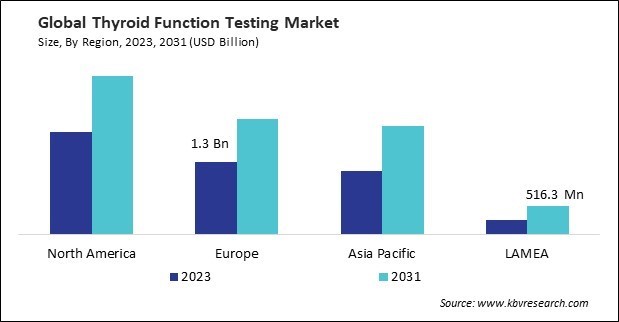According to a new report, published by KBV research, The Global Thyroid Function Testing Market size is expected to reach $7.5 billion by 2030, rising at a market growth of 6.4% CAGR during the forecast period.
Clinical practice guidelines issued by professional organizations and healthcare societies provide evidence-based recommendations for appropriate thyroid function testing in various clinical scenarios. These guidelines help standardize testing protocols, promote adherence to best practices, and guide healthcare providers in interpreting test results and making informed clinical decisions. Additionally, integrating thyroid function testing into electronic health records (EHR) and laboratory information systems (LIS) has facilitated seamless test ordering, result reporting, and data management.

AI-driven algorithms and machine learning models are being integrated into thyroid function testing platforms to enhance diagnostic accuracy, predict patient outcomes, and optimize treatment algorithms. AI-enabled decision support tools assist clinicians in interpreting test results, identifying patterns, and predicting disease trajectories, improving diagnostic efficiency and clinical decision-making in thyroid disorders. Likewise, the advent of wearable devices and remote monitoring technologies enables continuous monitoring of thyroid function and hormonal fluctuations in real time.
Ongoing research efforts focus on identifying novel biomarkers and imaging technologies for diagnosing and monitoring thyroid disorders. Biomarkers such as microRNAs, circulating tumor cells, and extracellular vesicles hold promise for early thyroid cancer detection and treatment response prediction. Advanced imaging modalities, including functional MRI, molecular imaging, and optical coherence tomography, offer high-resolution thyroid anatomy and pathology visualization, enhancing diagnostic accuracy and precision in thyroid function testing. The thyroid function testing market has witnessed significant advancements and innovations in recent years.
The thyroid function testing market is poised for significant expansion driven by several key factors. Firstly, increasing awareness and diagnosis of thyroid disorders, including hypothyroidism, hyperthyroidism, and thyroid nodules, are driving the demand for thyroid function testing globally. Moreover, advancements in diagnostic technologies, including automated immunoassays, molecular diagnostics, and point-of-care testing, enhance the accuracy, speed, and accessibility of thyroid function tests, expanding their utility across diverse healthcare settings.
The Hospitals segment is registering maximum revenue in the Global Thyroid Function Testing Market by End-use in 2023; thereby, achieving a market value of $2.9 billion by 2031. Hospitals typically employ multidisciplinary healthcare teams comprising physicians, endocrinologists, nurses, and laboratory professionals collaborating to provide comprehensive patient care. Thyroid function testing is essential for these teams to accurately diagnose thyroid disorders, monitor treatment efficacy, and adjust management strategies as needed.
The Free T4 Test segment is experiencing a CAGR of 6.1% during (2024 - 2031). Free T4 testing is essential for monitoring patients undergoing thyroid hormone replacement therapy, such as levothyroxine (T4) supplementation for hypothyroidism. Maintaining free T4 levels within the therapeutic range is crucial for optimizing treatment efficacy and preventing adverse effects. Also, thyroid function testing, including free T4 measurement, is routinely performed during pregnancy to assess maternal thyroid status and ensure optimal fetal development.
Full Report: https://www.kbvresearch.com/thyroid-function-testing-market/
The North America region dominated the Global Thyroid Function Testing Market by Region in 2023, and would continue to be a dominant market till 2031; thereby, achieving a market value of $2.9 billion by 2031. The Europe region is anticipated to grow at a CAGR of 6% during (2024 - 2031). Additionally, The Asia Pacific region would witness a CAGR of 7.2% during (2024 - 2031).
By End-use
By Test Type
By Geography
 Unique Offerings
Unique Offerings